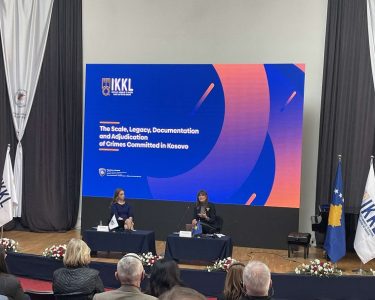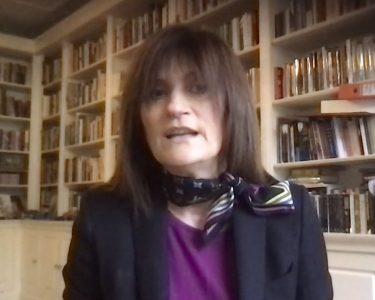Serbia has started another parallel way to destabilize Kosovo and create more chaos, says Nevenka Tromp, lecturer of East European Studies at the University of Amsterdam, in an interview for KosovaPress.
Tromp says that Serbia has never given up the territory of Kosovo.
Commenting on the developments in the north of the country, where the Serbs have set up barricades, Tromp emphasizes that Serbia will try to misuse any political situation to take advantage of the north of Kosovo.
“Serbia now has been starting another parallel way to destabilize Kosovo and to create more chaos in the way that some hard work of more than 10 years, since 2008 onwards, has been derailed. And what I’m talking about is the fact that Kosovo Serbs did go to elections in the past, Kosovo Serbs did take part in executive power, and now that very hard work is challenged and may be undone, and everything what is happening now simply destabilizes Kosovo’s achievements since 2008, and unfortunately the fact that court has issued its first judgment, and the fact that Kosovo Albanian side cooperated with the court, and is supporting it still, despite its shortcomings, cannot, absolutely cannot compensate for many open political questions that Serbia every time puts on table, because Serbia never gave up the territory of Kosovo and Serbia at least will try to use and abuse every political situation to request or demand at least Northern Kosovo and Association of Serb communities to be actually united with Serbian properties”, says Tromp.
The expert on Balkan issues asserts that Kosovo must exist within the current state borders it has.
“We are at this very, very important crossroad, and it is difficult to see that after 2008 a period of some hope to stabilization, we are now back to fight the basics. Can Kosovo exist in its current state borders? The answer obviously is that it can and it should, but destabilization and creation of permanent instability will make recovery of Kosovo and Kosovo’s path to EU more rocky than normally should have been the case”, she adds.
The researcher of the Hague Tribunal for the former Yugoslavia says that the Kosovar politicians who have supported the creation of the Special Court have done that, so that Serbia does not have arguments against Kosovo.
But, according to her, Serbia has abandoned the path of responsibility.
“One of the arguments to constitute the Kosovo Specialist Chambers, say before 2015, was that establishing such a legal structure that would also deal with crimes committed by Kosovo Liberation Army should actually be important element to this path of appeasing Serbia in, at certain stage, recognizing status of Kosovo as an independent state, and I think many of your politicians who were lobbying within Kosovo parliament for the constitution of this court, the Kosovo’s Specialist Chambers in the Kingdom of Netherlands had that political purpose in mind. ‘We’ll do everything that International Community asks from us because we want to show that we belong to civilizational world of developed democracies and accountability, and justice is part of it’. And they did it because they wanted Serbia at certain point to have no arguments anymore, to say ‘but Kosovo doesn’t do this, Kosovo didn’t do that”. However, the court has been established, the first indictments have been issued, but Serbia has now totally absolutely abandoned this path of accountability. It’s enough now for Serbia that some prominent leaders of KLA are detained in The Hague waiting for trial.” she says.
The Special Court on Friday announced the first verdict on the allegations of war crimes and former KLA commander Salih Mustafa was sentenced to 26 years in prison.
“There are many issues in this summary judgment, and yet again we have to see what we will be following up, but first of all I think what this judgment shows, Salih Mustafa’s judgment, or what summary of the judgment shows to the world is that they again say: ‘look all the six victims in Salih Mustafa’s trial are Kosovar Albanians, those who were projected to be traitors or collaborators, and there are so far no Serbs victims’, so they, almost between the lines, say it’s okay, it’s really the court against Kosovo Albanian alleged perpetrators for the suffering of Kosovo Albanians victims the so-called perpetrators”, she says.
She mentions some of the problems that, according to her, have led to this case.
“And one of the huge issues that I have when I read an indictment of Salih Mustafa, or an indictment of other indintees so far, 5 of them still there waiting for the trial, is that if you read an indictment and now a summary judgment you have no idea what sort of conflict it was, there is no contextualization. Why there was such a need for makeshift detention center in this area, in Zllash area, because suddenly they were sending Serb forces and they had to abandon the detention center and they left behind one of the wounded detainees, but they don’t understand in what sort of circumstances this was happening, and I think it is going to be repeated in the way presented now during the trial and in the judgment we will be simply denied to understand the gravity of much bigger war, and much bigger crimes happening in the same time, and it was a context of Serbian forces, military police forces being busy since 24 of March to conduct a huge sweeping up military campaign actually to expel as many Kosovar Albanians from Kosovo in order to keep Kosovo under sub control, not one word of contextualization of the war we could read in indictment or in the evidence or in the summary judgment. I think it is a huge shortcoming and this is not how the law should function.” says Tromp.
Even in the hearing of the announcement of the judgment, the panel said that the court is not against the KLA.
Chief judge Mappie Veldt Foglia said that the court was created by the people of Kosovo, through the institution of the Assembly. “If you read the summary judgment, the presiding judge had to spend two or three paragraphs, again to confirm and tell to the outside world, what is the legality of legitimacy of the court, so basically what they are saying is ‘We are the court that you people from Kosovo wanted and you did it for your own Parliament and because you wanted it, we are doing this, for you, we are your court’, and then they say, ‘we are not here to judge Kosovo’s Liberation Army, KLA, we are not here to judge Kosovo’s people, because we are going to concentrate only on individuals’ and then, after that they say, for whatever judgment is going to be, ‘we had huge problems because witnesses were problematic because they get threatened all the time’. So, again at the beginning already, the judges and the court find all the reasons to cover themselves and to explain that actually, it’s okay that we are here, maybe we will disappoint you, but we have that good foundation’. The court shouldn’t be explaining itself, the court should act as the legal authority and deal only with the issues in front of it, and the issues in front of every court and judges is actually the defendant, the most important person in this whole judgment should be Mr. Mustafa, because it’s his life that is at stake, and his rights and fairness of his trial that judges should be mostly concerned with, and not about their public image that they will project, knowing actually that would follows at the end the number of years in prison for Mr. Mustafa might actually be met with a huge criticism in Kosovo. So, this court and these judges are very much busy with themselves, an image of the court, and it distracts their attention from the defendant.” says Tromp.




